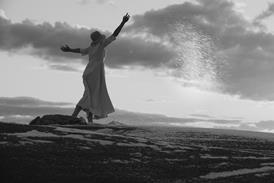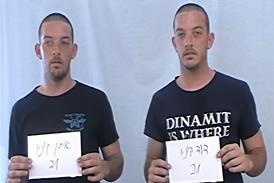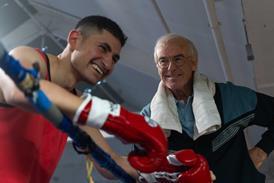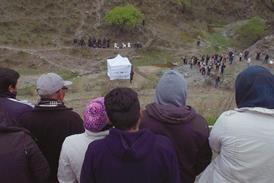Dir/scr: Reha Erdem. Turk.2006. 110mins.
Looking every inch the festival warhorse, Times And Winds,Reha Erdem's contemplativeobservation on life in a remote Anatolian village, is the kind of picture criticswill adore and film events queue for.
Subdued, low key andpractically plotless - it is reminiscent of both Ki-duk'sSpring, Summer, Fall, Winter' And Spring,if without the metaphysical pretensions and Gyorgy Palfi's Hukkle - Erdem's fourth feature proceedsat an unhurried, reflective pace.
Creating a mood of perfectharmony between villagers and the nature surrounding them, it may not bemultiplex fare but will deservedly draw attention from arthousepatrons. At Istanbul, where it premiered, it won both the best Turkish film andFIPRESCI prizes.
The film's original title, Five Times, (by which it is still knownat home) refers to the daily calls to prayer through which time is marked inthe Turkish countryside.
Although the action is setin the present, the picture has a timeless feel, located as it is in a village seeminglyunaffected by the modern world. The inhabitants, who endure a tough existence,follow a strict patriarchal lifestyle in their ramshackle stone homes. The fatheris the master of the house, dispensing corporal punishment whenever he feelsthe urge.
While faith is piously observed,inhabitants also respect knowledge and pool their meagre resources to help ayoung school teacher (Ergec) who needs a fridge. Noone feels the need to express themselves in words, except when it is absolutelynecessary. Near-inexistent dialogue therefore forces the audience to readeverything they need to know from the eloquent images.
Yet while Times And Windssounds like a documentary, Erdem skilfully insertsmyriad subplots, most of which focus on three young children. Two of theyoungsters are afraid to share their feelings with anyone else. Omer (Ozen), the Imam's (Yarr) son,passionately wishes to see his father dead, while Yakup(Kayali) is desperately infatuated with his prettyyoung teacher (Ergec). The almost narcoleptic Yildiz (Iscan) minds the housewhen her mother gives birth to a much-wanted boy.
Other plotlines include anold man (Turel), whose twoadult sons, both married and with children of their own, still fear hisbeatings; a kindly grandmother who has grown tired of life; and an orphanedvillage shepherd who functions as a Pan-like presence Erdemborrows from neighbouring Greek mythology.
Through these Erdem raises such issues as early sexual awakening,rebellion against parents and communion with nature without forcing them on tothe audience.
At first glance such storiesmay resemble a poetically pastoral portrait of life eternal in the country. Butbeneath the surface lurk some powerful and emotional dramas, which Erdem makes his audience unravel, fed by a steady flow ofsmall but telling events.
Performances by thenon-professional cast are unaffected and the best complement to the material.
Exemplary widescreenphotography proves arresting while possessing a rough edge that guards againstthe kind of fake postcard glamour often encountered in this kind of picture.
The music of Estoniancomposer Arvo Part underlines, if at times toopointedly, proceedings but is nevertheless a natural fit with the leisurely,magisterial pace imposed by Mother Nature.
Production company/internationalsales
Atlantik Film
Producer
Omer Atay
Cinematography
Florent Herry
Editor
Reha Erdem
Music
Arvo Art
Main cast
Ozkan Ozen
Ali Bey Kayali
Elit Iskan
Bulent Emin Yarar
Taner Birsel
Yigit Oszener
Selma Ergec
Tarik Sonmez
Cuneyt Turel









![[Clockwise from top left]: 'The Voice Of Hind Rajab', 'A House Of Dynamite', 'Jay Kelly', 'After The Hunt', 'The Smashing Machine'](https://d1nslcd7m2225b.cloudfront.net/Pictures/274x183/1/7/0/1459170_veniceawards_837515.jpg)









No comments yet